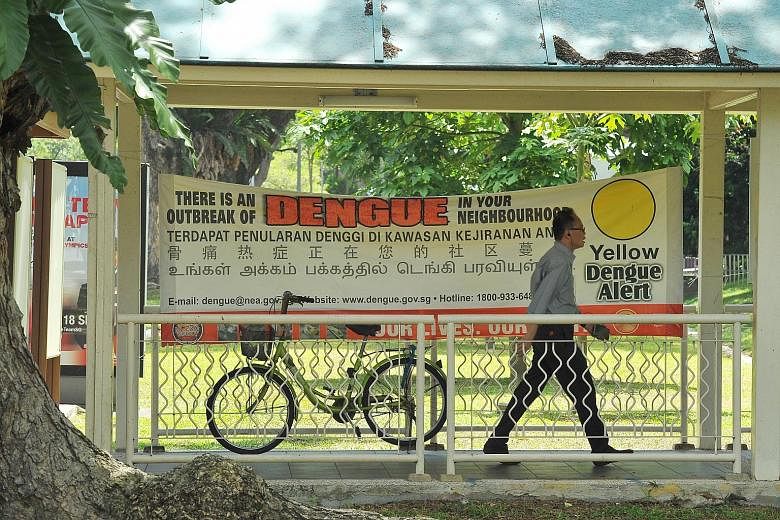Just a few more people are needed to test what could promise to be the world's first dengue treatment, but the study has hit a snag.
Scientists at the Duke-NUS Medical School, who are behind the project, used to get three to five new patients a week. But there have been none in the past three weeks.
They have recruited around 75 dengue patients so far, and are hoping for at least 30 more to join the clinical trial.
With the spotlight on the Zika virus in recent weeks, however, recruitment for the dengue project has proven a bit harder.
"Even with Zika, dengue is still the major problem for Singapore," said Assistant Professor Ashley St John, who is from the school's emerging infectious diseases programme.
-
THE SPREAD
12,000
Number of dengue cases since the start of the year
23
Cases of dengue haemorrhagic fever
"We still want to do research that's related to dengue because it's a major concern."
There have been nearly 12,000 dengue cases since the start of the year, including 23 cases of dengue haemorrhagic fever - a more serious form of the mosquito-borne disease which can result in fluids leaking out of a person's blood vessels.
No treatment beyond supportive care is available, although Prof St John and her team hope to change that by using Ketotifen, a drug that has been used for more than 30 years in the treatment of asthma and allergies.
The researchers hope that in dengue patients, the drug will stop cells that line the blood vessels from "overreacting", and thus limit the damage to blood vessels that occurs when someone has dengue fever.
To study this, researchers will be carrying out two MRI scans on dengue patients, which will help them measure the precise volumes of fluid that leak out of blood vessels.
This technique is a first, said Professor Paul Tambyah of the Yong Loo Lin School of Medicine at the National University of Singapore.
"Dengue occurs mainly in developing countries, but they don't have the access to MRIs that we do," he explained.
"(The study) is going to open the door to see what we can do for the severe cases - if it really works then it's a pathway that other scientists and clinicians can work on."
Doctors have also known for a long time that dengue seems to be associated with liver issues, and the MRI scans - which show the top part of the liver - could also give them a glimpse of how the virus affects this organ.
Said Prof Tambyah: "We know that between 20 and 30 per cent of people with dengue who are symptomatic will have abnormal liver function tests."
Those who are interested in joining the trial must be aged between 21 and 60, and should have had dengue symptoms for less than three days.
They will have to undergo a blood test to check if they are positive for the virus, followed by seven check-ups, and will receive payment for their time and transportation costs.
Those who wish to participate can call 8591 7313 or 85952343.


